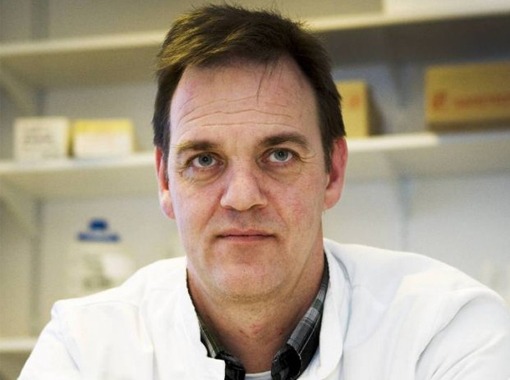Doctoral defence in Biology - Árni Kristmundsson

Askja
Room 132
Ph.D. student: Árni Kristmundsson
Dissertation title: The nature and pathogenicity of apicomplexan parasites associated with mass mortality events in scallop (Bivalvia; Pectinidae) populations in the North Atlantic Ocean
Opponents:
Dr. Sonja Rueckert, Associate professor/Senior Lecturer in Marine Biology at Edinburgh Napier University, United Kingdom.
Dr. Jörundur Svavarsson, Professor at the Faculty of Life and Environmental Sciences, University of Iceland.
Thesis evaluation committee:
Dr. Sonja Rueckert, Associate professor/Senior Lecturer in Marine Biology at Edinburgh Napier University, United Kingdom.
Dr. Jörundur Svavarsson, Professor at the Faculty of Life and Environmental Sciences, University of Iceland.
Guðrún G. Þórarinsdóttir, Marine Invertebrate Biologist at the Marine and Freshwater Research Institute in Iceland.
Chair of Ceremony: Dr. Anna Dóra Sæþórsdóttir, Professor at the Faculty of Life and Environmental Sciences, University of Iceland.
Abstract:
Apicomplexans comprise a group of unicellular, often highly pathogenic, obligate parasites infecting both vertebrates and invertebrates, exploiting either one (monoxenous) or two hosts (heteroxenous) to complete a full reproductive life cycle. Their pathogenicity varies considerably between species and/or their hosts but as most species are obligate, intracellular parasites they cause some level of pathology in all cases.
In relation to abnormal mortality events experienced in scallop populations in the North Atlantic, four different species of scallops, i.e. Iceland scallop, queen scallop, king scallop and sea scallop, were examined for infectious agents, with the aim of shedding light on these events. Most emphasis was made on the Iceland scallop stock in Icelandic waters that unexpectedly collapsed during the 2000s. Its health status was annually monitored for 14 years. In addition to the scallops, whelks and other mollusc species were examined at later stages in the study, in context with presumable life cycle of a pathogen observed.
Two different apicomplexan species, both of which appeared to be previously unknown, were identified: 1) Margolisiella islandica, a novel species infecting the heart auricles and highly prevalent in Iceland scallop, without causing any significant pathology, but absent in the three other scallop species. It is a monoxenous species, with all life stages present in a single host, i.e. the Iceland scallop. 2) Initially anonymous species, infecting muscular- and connective tissues, was found in all four scallop species examined. Except for scallops from the UK, infections were generally heavy, causing severe histopathological changes leading to significant reduction in the general condition of the scallops, especially adductor muscles, which become abnormally reduced and discoloured. Furthermore, it hampers normal gonad development, at least in the Iceland scallop. Molecular studies and in situ hybridization, revealed that it is conspecific with Merocystis kathae, an apicomplexan described from the common whelk, Buccinum undatum, more than 100 years ago. Consequently, its life cycle is heteroxenous, involving the common whelk as a definite host and scallops as intermediate hosts. This is the first dual mollusc life cycle described for an apicomplexan.
M. kathae forms a fully resolved monophyletic clade with Aggregata spp. This aggregatid clade is associated with a sister clade containing Filipodium phascolosomae and Platyproteum vivax (Archigregarinorida (Squirmida)) from sipunculids. M. islandica and Pseudoklossia pectinis do not form part of this clade, but form a group Rhytidocystid species, infecting marine bivalves and polychaetes. This entire group forms a weakly supported clade of apicomplexans that are found in marine invertebrates.
The results strongly suggest that M. kathae played a major role in the collapse of the Iceland scallop stock in Breidafjordur, Iceland. Furthermore, it caused abnormal condition of Faroese queen scallops and is a suspected aetiological agent behind mass mortality events of sea scallops in the eastern USA as well as a number of unresolved mass mortalities and abnormal condition experienced in various other populations of scallops. Scallops seem able to regulate low-level infections of M. kathae, as they exist in normal scallop populations. However, during prolonged or high levels of exposure from localised infected whelks, disease outbreaks occur. Hence, reasonable fisheries from both whelk and scallop stocks could lower infectious load and minimize the occurrence of M. kathae epidemics and prevent damaging economic losses.
About the doctoral candidate:
Árni Kristmundsson was born in Reykjavik in the year 1966. Following matriculation in 1986, he worked in car repairing and ran a business in that field together with his brother for 9 years. At the age of 30, he started studying biology at the University of Iceland and graduated with a B.Sc. degree in1999 and an M.Sc. degree from the same universtity in 2003. Since 1999, Árni has worked at the Fish Disease Laboratory at the Institute of Experimental Pathology að Keldur, University of Iceland. Since 2009, he has been the head of the Fish Disease Laboratory. Árni has two sons and his spouse is Ragnhildur Þ. Magnúsdóttir, biologist at the Marine- and Freshwater Research Institute in Iceland.
Árni Kristmundsson



